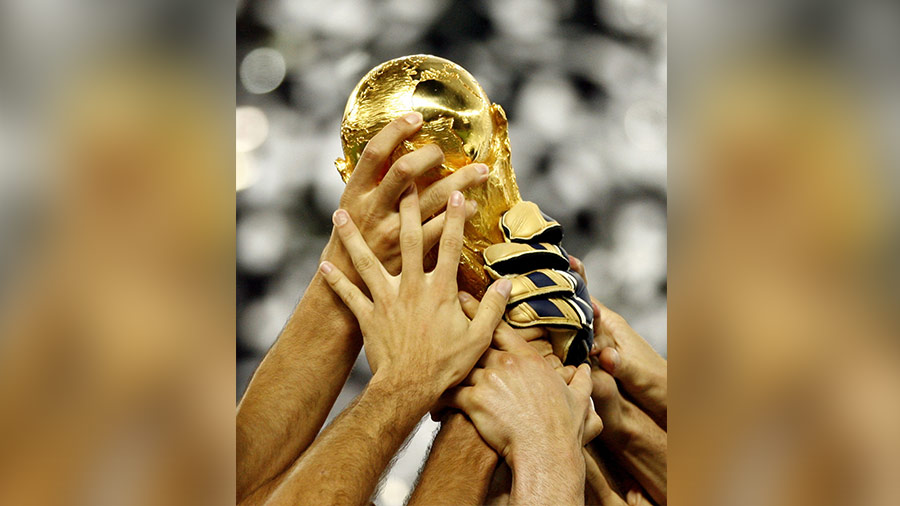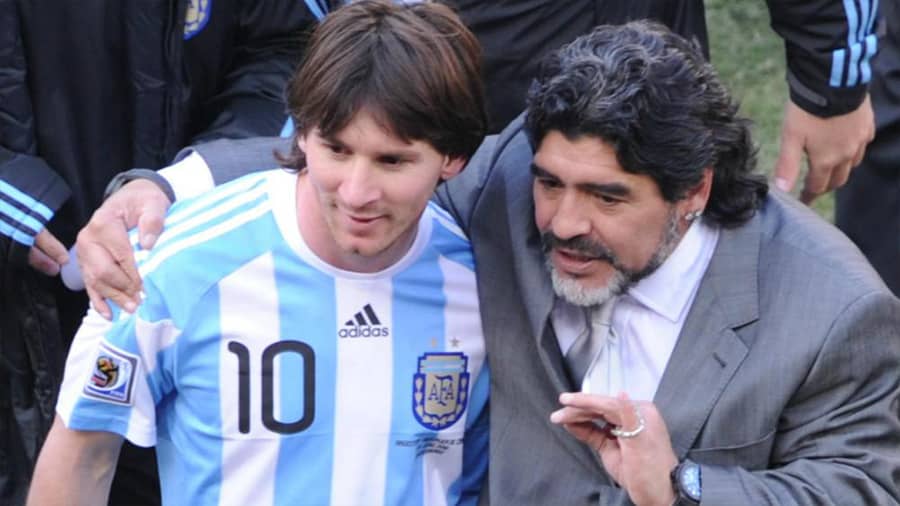Having watched every FIFA World Cup since 1978, veteran Argentine journalist and historian Luciano Wernicke has long wanted to write about the greatest showcase of the beautiful game. After years of research, fact-checking and furious typing in his Buenos Aires home, Luciano’s magnum opus — The Most Incredible World Cup Stories (published by Niyogi Books in India) — is ready for the world to savour and can be purchased here.
Below are three excerpts from the book, each connected with a major story from the last three World Cups, which take their pride of place alongside hundreds of stories from the 18 other editions of the tournament in Luciano’s compilation.
I only ask to God (Russia 2018)
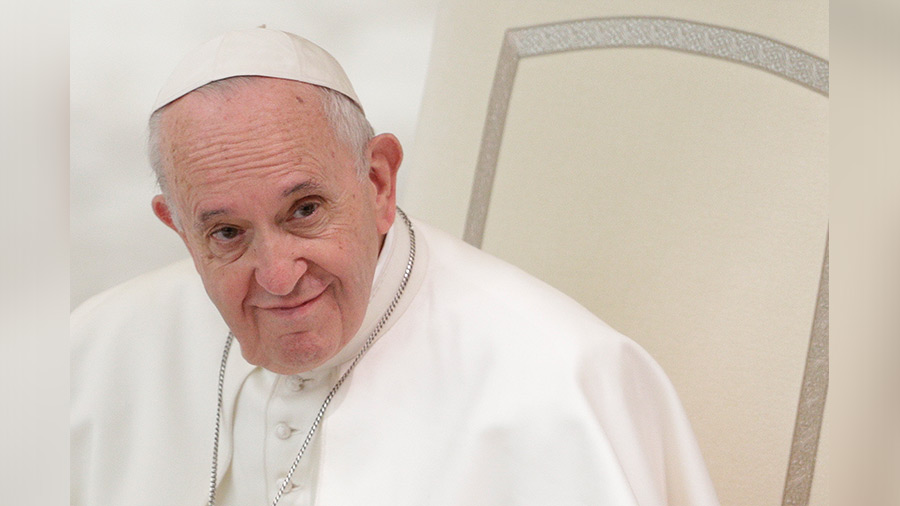
Pope Francis had his part to play in Peru’s journey to the 2018 World Cup TT archives
Afflicted by the absence of his national team in eight consecutive World Cups, the president of Peru, Ollanta Humala, took advantage of a visit to the Vatican to make an unusual proposal to Pope Francis. “Knowing about your football passion, I give you the shirt of the Peruvian team and I ask you to help us with the Heavenly Father so that Peru can be in the World Cup again,” Humala told the Supreme Pontiff during their meeting. Francis’s management was successful because, to the happiness of Humala and all his people, Peru managed to qualify for the World Cup after 36 years of absence from the highest football event. The white-and-red squad arrived in Russia, thanks to the intercontinental play-off against New Zealand…and the invaluable divine intervention.
The bite (Brazil 2014)
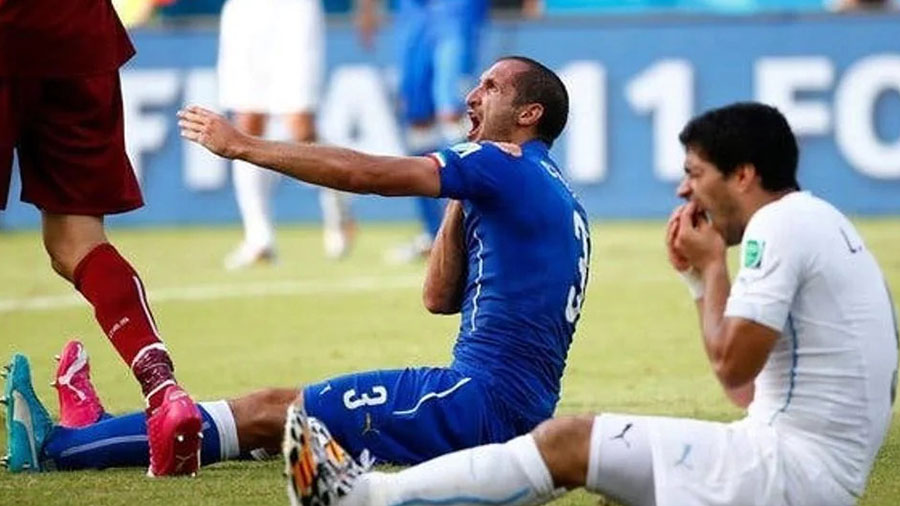
Giorgio Chiellini and Luis Suarez were involved in one of the most infamous World Cup incidents in 2014 FIFA
Group D was called the “Group of Death” in this edition, with the heavyweights, former champions England, Italy and Uruguay, along with the weak representation of Costa Rica. The competition began with a surprise Central American victory over Uruguay (3–1) and an attractive Italian triumph against the British delegation. On the second date, Uruguay recovered and eliminated England, while Costa Rica once again moved its fans with another glorious day, against Italy, by establishing itself as the first of the survivors of the tricky quartet. In this context, on June 24, at the Estadio das Dunas in the city of Natal, the South Americans and the Azzurri got together to play a game hotter than the Brazilian climate, which that day raised the mercury to 33°C. Europeans had the advantage of having a better goal difference, so a draw was enough to move on to the next phase. The encounter was locked, tense, sizzling. In the second half, with the score still at 0-0, Mexican referee Marco Rodríguez sent off Italian Claudio Marchisio for having kicked the right leg of Egidio Arevalo Ríos. The stiffness did not dissipate and, 10 minutes before the end, the defender Giorgio Chiellini and the forward Luis Suarez collided and fell together within the Azzurri area. Rodríguez whistled for a free-kick for Italy while the defender wriggled in pain and denounced having been bitten by the South American attacker. The referee let the claim pass, since he had not noticed anything, as did his collaborators. The game continued and, a minute later, the Uruguayan Diego Godín scored the only goal of the match with a header. After the final whistle, the eliminated Italians complained about the referee’s leniency towards Suarez and raised a protest. FIFA took up the glove, analysed the images of the match, warned that the Uruguayan had a history in the matter—in 2010, when he was a member of the Dutch club Ajax, he had received a seven-match suspension for having bitten a PSV Eindhoven player, Otman Bakkal; in April 2013, during his time with the English team Liverpool F.C., he did the same to the Serbian defender of Chelsea F.C., Branislav Ivanovic and was punished with another 10-game ban—and decided to disqualify Suarez for nine official matches with his national team, after finding him guilty of “having committed an offence to sportsmanship against another player”.
The World Cup ended for the striker, but the punishment was not limited only to playing: “For four months, Luis Suarez is prohibited from engaging in any kind of activity related to football, administrative, sports or of any other kind”, which vetoed his training sessions with Liverpool, and also “entering the venues of all stadiums during the period of the ban”. Moreover he was fined 100,000 Swiss francs. The controversial case went around the world and transcended football frontiers. In several countries, bottle openers appeared with the footballer’s face and his prominent teeth as a lever. In Sweden, the sex-toy store Oliver & Eva launched the “Suarez nipple clamps”, a very creative product to stimulate and enhance pleasure. “Maybe we should send him a sample. He might be proud to spread a bit of pleasure and love, despite his mistake on the field,” said the store director Tobias Lundqvist.
Perhaps, the most curious thing about the case was that 167 people from 20 countries bet before the start of the contest, through the website of the gaming house Betsafe, that the Uruguayan striker would use his teeth to attack an opponent. The winners pocketed a prize equal to 175 times the value of their wager.
Once the suspension was completed, Suarez went to FC Barcelona. Three years later, he met Chiellini again on a pitch when the Catalan team met Juventus in the quarter-finals of the Champions League. The footballers, this time, treated each other with enormous respect and, when the competition ended, exchanged their jerseys.
An eight-legged star (South Africa, 2010)
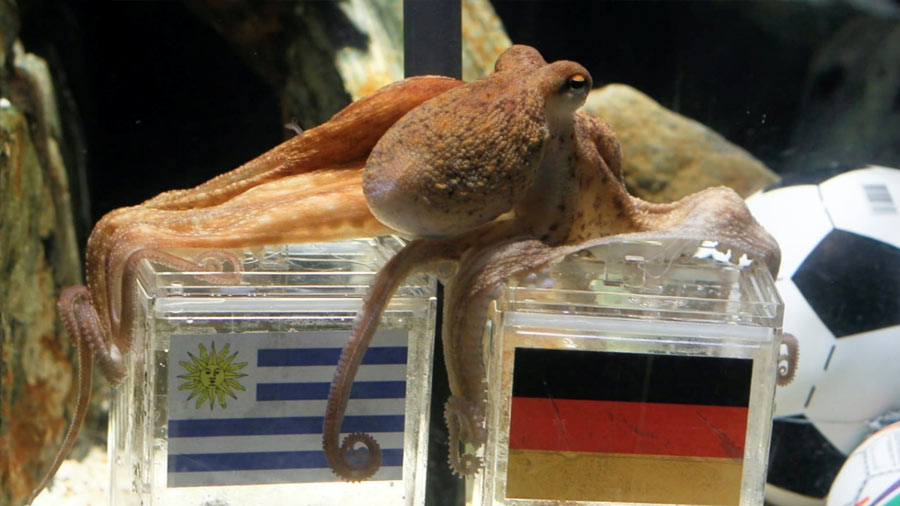
Paul, the octopus, got every single one of its predictions correct during the 2010 World Cup TT archives
There is no rational explanation to clarify the incredible performance of the octopus Paul, the greatest star of the World Cup in South Africa. The cephalopod mollusk guessed, from an aquarium located in Germany, the eight World Cup matches for which it was consulted, including the final. The system of the eccentric oracle was simple: before each game played by the German team, the caretakers of the Sea Life Park in the town of Oberhausen offered Paul—who had been born in Weymouth, England—two acrylic containers, one with the flag from Germany and another with that of its rival, and a succulent clam inside each. The octopus came down and wrapped its tentacles around one of the two cubes, which was taken as its prediction. Paul did not miss a single omen: he even anticipated Germany’s two defeats, against Serbia (in the first round) and Spain (in the semi-final). After the German defeat, Paul’s custodians went for more and asked who would be the champion. The octopus, without hesitation, pounced on the container that carried the Spanish flag and swallowed its clam in a few seconds. The fame of the invertebrate generated all kinds of analysis and comments, and it was even said that it had received death threats.
